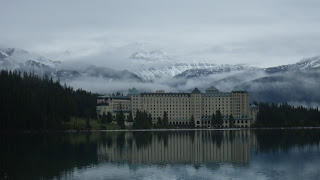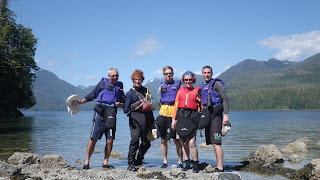One of the amazing things about taking serious time away from work is the freedom and ability to actualize trips with family and friends that would otherwise remain distant dreams, to be discussed as a future possibility year after year.
For quite sometime, my Dad, Richard, and I had been discussing doing a big trip together - something outdoorsy and adventurous as we both share a love for nature, albeit from different approaches of how best to sleep in nature (i.e., the Chateau Lake Louise vs. MEC's Wanderer tent).
On June 4 we met in Calgary, AB for the "short" drive to Canmore. Calgary has changed so much in the past few years that our Garmin GPS device landed us in the parking lot of a rather nice golf course instead of the TransCanada #1 Highway to go west. A lesson learned in not over-relying on technology.
The next day we arrived at Lake Louise and hiked up to the Lake Agnes Tea House (which luckily was open), before returning for a round of Caesars at the Chateau Lake Louise.
 |
| (Chateau Lake Louise) |
The drive to Vancouver was interrupted by a mudslide that closed a major section of the TransCanada Highway, forcing us to backtrack and take the longer northern route through Jasper. Not such a hardship when I consider that we saw black bears, big-horn sheep, and deer along the way.
 |
| (The appropriately named Big-horn sheep) |
We joined our guide Liam and Dean and Shauna from Calgary, and as a group covered over 65km by kayak around Meares Island in the Clayoquot Sound region. You may have heard of Clayoquot Sound in the context of the opposition to logging in the 1990s that drew major attention to the region (note the battle is not over and the area is under constant threat from different forms of development).
First Nations have inhabited the area for thousands of years and it is truly remarkable: forests thick with giant Western redcedars and the great Douglas Fir, innumerable inlets and mudflats, great birds (like Osprey and bald eagles) with a backdrop of snow-capped mountains in the distance.
 | ||
| (Group shot using the auto-pic function and the advanced Nalgene water bottle tripod) |
The last few days of the trip we spent in Campbell River (famous for its Salmon fishing), Victoria (famous for its high retiree to non-retiree ratio - which is what attracted me to it :), and spending time with family and friends in Vancouver (famous for...I don't know...being the coolest place ever). The West Coast is pure magic.
Though the most exciting part of the trip was the kayaking, what I will remember the most is the fantastic chats we had along the way; driving in the car, waiting for a ferry, or avoiding getting up and out of warm sleeping bags in the tent. We both agreed that life is too short not to make the most out of every opportunity there is to have fun and connect with family. I'm already looking into kayak trips for next year, which my brothers have made clear they would like to be a part of!
 |
| (Plenty of time for pictures when your not actually catching fish) |